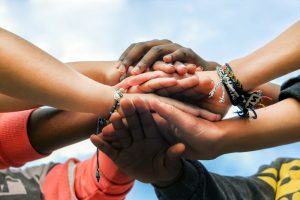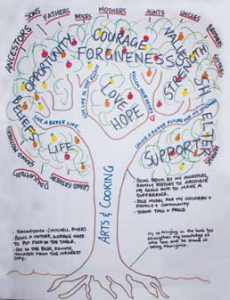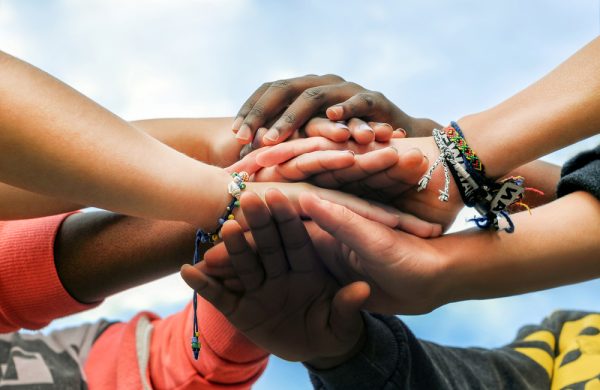
One way to ensure a day of workshops on healthy relationships is relevant to youth is by making sure that young people are engaged in the conference planning and presentations from the get-go.
That’s a major takeaway for the Contra Costa Amplify Healing Partnership, which hosted more than 30 youth from Contra Costa County on March 26 at a Courageous Conversations conference held at UC Berkeley. The Contra Costa County Family Justice Center, which serves families affected by domestic violence, sexual assault, child abuse, elder abuse, and human trafficking, organized the event along with its Amplify partners. Adult organizers worked in collaboration with 10 youth leaders to map out the day’s activities, including one workshop that was conceived and lead exclusively by adolescents. “Don’t underestimate youth. They need support and scaffolding, but it’s important to see youth as human beings,” says Vy Vo, Family Justice Center program manager, who came up with the conference idea after community surveys uncovered a need to help youth understand what constitutes healthy relationships. “If we want to commit to building up youth as stable and empowered so they can defend against violence, we have to be models for youth,” she said, noting that means showing teens what to do rather than telling them what to do. The conference planners also encouraged adult organizers and workshop leaders to refer to themselves as “adult allies” to break down hierarchical power dynamics and operate with an equity lens. The Family Justice Center, in conjunction with other community organizations dedicated to serving youth — CASA (Court Appointed Special Advocates) for Children, City of Antioch Council of Teens, Contra Costa County Office of Education, Love Never Fails, Lincoln Families, and John Muir Health’s Beyond Violence — wanted to explore with teenagers the difference between healthy and unhealthy relationships. Among other things, this means learning appropriate ways to communicate with family, friends, dating partners, peers, and adults in their lives. The Contra Costa partnership is part of Amplify Healing Connections, a CCI program supported by the Blue Shield of California Foundation. It was created to help youth at risk of domestic violence, which includes the risk of violent or aggressive behavior within the home, often including verbal abuse, threats, and physical assault, and typically involves the abuse of a spouse or partner. Nearly 30 million children under 17 throughout the country have witnessed such abuse in the home, and left unaddressed, this can undermine their future relationships, education, and health.healing from early adversity
Since many teens are exposed to violence that puts them at risk for intimate partner violence or domestic violence, organizations that serve vulnerable youth are trying to amplify positive experiences in childhood and adolescence (PCEs) to help prevent, heal, and even reverse the impact of early adversity. Amplify Healing Connections, which has been up and running for a year now, uses a health equity lens to promote health and well-being for both youth and their adult allies by strengthening healthcare systems and community-based organizations that provide services to them in their neighborhood. Most of the participants in the conference were 15 and over, says Natalie Oleas, central center director for the Family Justice Center, and many came from group homes or foster families. A significant number of the participants noted on a pre-conference survey that they were “neutral” about their ability to identify what healthy communication in relationships looks like. “Not everybody lives in a home with healthy communication,” says Oleas. Post-conference, though, many more participants felt confident they could describe the kind of communication that characterizes a healthy relationship. That’s a win from the conference planners’ perspective. The pre- and post-conference survey also asked participants whether they knew what to do when there is unhealthy communication in relationships and where to reach out for help if necessary. Each session consisted of 10 or 11 participants, who rotated through three different workshops, with attendees sitting in a circle in the spacious auditorium. One workshop, led by Monica Wilson of the nonprofit human trafficking survivors support organization Love Never Fails, explored the difference between consent and coercion. Wilson, who is also a councilmember for the city of Antioch, stresses that to end relationship abuse, we must talk about it and have open and honest conversations about relationships and what makes them healthy or abusive. ”Eighty-one percent of parents don’t believe teen dating violence is an issue and is happening out there,” said Wilson on a teen dating violence awareness month conversation in 2021. “Or at least they think it’s not happening to their child.” Wilson wants vulnerable youth to know they are loved, strong, and there are people and places to get help about teen dating violence, including organizations like Love Never Fails. Wilson’s call to action for youth: Educate yourself about teen dating violence, talk to trusted loved ones about it, and ask your cities and schools what they are doing to protect the vulnerable from this trauma. Another workshop, run by Jessica Rojas, who heads up Contra Costa County school-based services for Lincoln Families, walked participants through what healthy relationship communication means in concrete terms.It's all about the base
The third panel, all youth led, was dubbed Root Yourself. It focused on grounding and developing a solid base through a self-reflection activity known as the tree of life, which is designed to help participants process where they have come from, where they are now, and their visions for the future. (Below is a tree of life drawing from the Dulwich Centre Foundation in Australia, whose employee David Denborough teamed up with Ncazelo Ncube to develop the activity to help children with AIDs/HIV in southern Africa.) “The youth facilitators created a very welcoming and engaging space from the start,” notes CCI program evaluation consultant Roza Do, who attended a session and did double duty as the in-house DJ. “They each shared a bit about their personal stories and the things that support their self-care/healthy relationship with themselves, which was a great segue into the tree of life activity. Do described the exercise as a powerful reflection and art activity to honor participants’ history and values (roots), acknowledge what drives us (trunk) and where we want to go and grow (branches and leaves), while also acknowledging the challenges and fears we need to overcome along the way (symbolized by grey clouds and lightning).
“We wanted to come from a trauma-informed lens,” explains Oleas, who notes it’s likely that some of the youth have experienced relationship violence. In addition, many acknowledge having difficulty expressing themselves in relationships.
Communication difficulties are just one of the problems stemming from traumatic experiences. Research has found that children and young people who live with domestic violence are at increased risk for developing depression, anxiety, and chronic diseases, including diabetes, obesity, and heart problems.
Young people exposed to violence at home are also more likely to suffer learning difficulties and act out at school. They have a 15 times greater risk of suffering domestic violence later in life. The coronavirus pandemic and related unemployment has made it even more critical to take steps to curb domestic violence, since lockdowns have been linked with an alarming rise in domestic violence and increasingly severe injuries. About 1 in 4 women and nearly 1 in 10 men experience domestic violence in their lifetime in the United States, according to the Centers for Disease Control and Prevention (CDC).
Meanwhile, others suffer from intimate partner violence (IPV), which refers to abuse or aggression that occurs in a romantic relationship. “Intimate partner” refers to both current and former spouses and dating partners. IPV can vary in how often it happens and how severe it is. It can range from one episode of violence that could have lasting impact to chronic and severe episodes over multiple years. IPV can include physical violence, sexual assault, stalking, and psychological aggression. When IPV occurs in adolescence, it is often called teen dating violence (TDV). TDV affects millions of U.S. youth each year. About 11 million women and 5 million men who reported experiencing sexual violence, physical violence, or stalking by an intimate partner in their lifetime said that they first endured these attacks before the age of 18, according to the CDC.
At the free, all-day event, though, the focus wasn’t on intense subject matter or disturbing statistics: There were also ice breaker exercises, a movement-based social activity, DJ Roza spinning classic soul, funk, and R&B tunes from the 70s, 80s, and 90s during breaks between sessions, and—since we’re talking about teens here—a hearty lunch. Organizers stressed how important it was to meet in person, noting that youth are “Zoomed out,” and appreciated meeting people from other schools and communities and having conversations outside the scope of the workshops, which aren’t possible in a virtual platform. A competitive relay race took place in the gorgeous sunny weather with the underlying goal of fostering team work and having fun.
The partners plan to follow up on the event with a meeting where they’ll discuss what worked and what didn’t and talk about ways to continue the conversation with youth leaders and conference participants. “In every domestic or intimate partner relationship, there is a communication issue, says Oleas. “We want to give youth the tools to use going forward in their relationships with the people they care about.” Oleas points out, too, that while her organization deals with these issues every day, that is not the case for all their partner organizations, who benefited, she says, from the conference’s intentional space and structure to address these concerns.
Adds Vo: “In terms of sustainability, I would be happy if a youth is so inspired that they talk about the conference with their community and do their own workshops. All the planning documents and tools that we develop will be open source, and we will share all of that. If they want to take that and build it into another program, that would be a success too.”
“The youth facilitators created a very welcoming and engaging space from the start,” notes CCI program evaluation consultant Roza Do, who attended a session and did double duty as the in-house DJ. “They each shared a bit about their personal stories and the things that support their self-care/healthy relationship with themselves, which was a great segue into the tree of life activity. Do described the exercise as a powerful reflection and art activity to honor participants’ history and values (roots), acknowledge what drives us (trunk) and where we want to go and grow (branches and leaves), while also acknowledging the challenges and fears we need to overcome along the way (symbolized by grey clouds and lightning).
“We wanted to come from a trauma-informed lens,” explains Oleas, who notes it’s likely that some of the youth have experienced relationship violence. In addition, many acknowledge having difficulty expressing themselves in relationships.
Communication difficulties are just one of the problems stemming from traumatic experiences. Research has found that children and young people who live with domestic violence are at increased risk for developing depression, anxiety, and chronic diseases, including diabetes, obesity, and heart problems.
Young people exposed to violence at home are also more likely to suffer learning difficulties and act out at school. They have a 15 times greater risk of suffering domestic violence later in life. The coronavirus pandemic and related unemployment has made it even more critical to take steps to curb domestic violence, since lockdowns have been linked with an alarming rise in domestic violence and increasingly severe injuries. About 1 in 4 women and nearly 1 in 10 men experience domestic violence in their lifetime in the United States, according to the Centers for Disease Control and Prevention (CDC).
Meanwhile, others suffer from intimate partner violence (IPV), which refers to abuse or aggression that occurs in a romantic relationship. “Intimate partner” refers to both current and former spouses and dating partners. IPV can vary in how often it happens and how severe it is. It can range from one episode of violence that could have lasting impact to chronic and severe episodes over multiple years. IPV can include physical violence, sexual assault, stalking, and psychological aggression. When IPV occurs in adolescence, it is often called teen dating violence (TDV). TDV affects millions of U.S. youth each year. About 11 million women and 5 million men who reported experiencing sexual violence, physical violence, or stalking by an intimate partner in their lifetime said that they first endured these attacks before the age of 18, according to the CDC.
At the free, all-day event, though, the focus wasn’t on intense subject matter or disturbing statistics: There were also ice breaker exercises, a movement-based social activity, DJ Roza spinning classic soul, funk, and R&B tunes from the 70s, 80s, and 90s during breaks between sessions, and—since we’re talking about teens here—a hearty lunch. Organizers stressed how important it was to meet in person, noting that youth are “Zoomed out,” and appreciated meeting people from other schools and communities and having conversations outside the scope of the workshops, which aren’t possible in a virtual platform. A competitive relay race took place in the gorgeous sunny weather with the underlying goal of fostering team work and having fun.
The partners plan to follow up on the event with a meeting where they’ll discuss what worked and what didn’t and talk about ways to continue the conversation with youth leaders and conference participants. “In every domestic or intimate partner relationship, there is a communication issue, says Oleas. “We want to give youth the tools to use going forward in their relationships with the people they care about.” Oleas points out, too, that while her organization deals with these issues every day, that is not the case for all their partner organizations, who benefited, she says, from the conference’s intentional space and structure to address these concerns.
Adds Vo: “In terms of sustainability, I would be happy if a youth is so inspired that they talk about the conference with their community and do their own workshops. All the planning documents and tools that we develop will be open source, and we will share all of that. If they want to take that and build it into another program, that would be a success too.”
Lessons learned
- Keep the focus on youth. Give adolescents opportunities to provide input at every step of the conference planning and production stage. They have good ideas, know how to speak their peers’ language, and understand what matters to them.
- Start outreach early. An uptick in COVID-19 numbers prevented in-person planning meetings and delayed the start of organizing the event. Give yourself more time than you think you need to recruit, engage, and train youth and settle on a conference agenda.
- Give partners specific markers. Ask each partner organization to recruit an agreed-upon number of participants to ensure desired conference size. (Contra Costa fell short of the 50 participants they had hoped for, but COVID and the location may have been a factor.)
- Frame the event to appeal to a wide audience. When marketing the event to youth, consider making space for participants from non-obvious sources (such as schools) and look for different incentives to attract participants (such as community service credits).
- Consider location. Conference organizers hoped to host the event close to home. But demand for meeting spaces in Contra Costa is at a premium due to the pandemic, so instead they searched further afield and settled on a college setting. While it was an added bonus for youth to explore the UC Berkeley campus—many had not been there before—the extra travel time likely affected the number of youths who attended.
- Solicit feedback. While the team did do a three-question pre- and post-conference survey, they acknowledged a missed opportunity by not leaving room for youth to share their thoughts, insights, and feelings leading into and after the conference.

